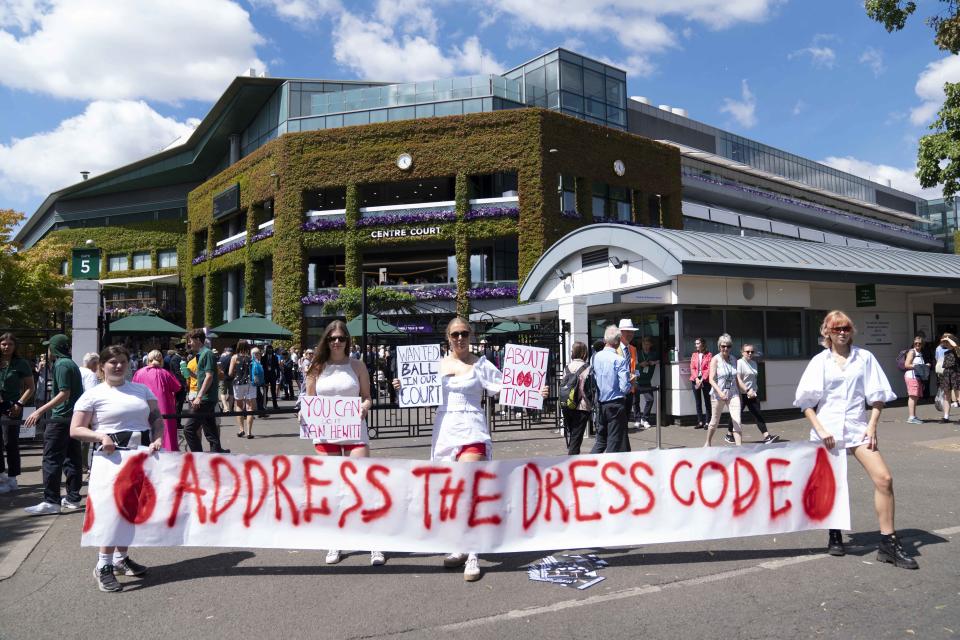Why this summer's big sporting events might look a little different
- Oops!Something went wrong.Please try again later.
Two of this summer’s biggest sporting events will look a little different, thanks to small but significant changes introduced to allow female stars to focus solely on their performance — and not fear period leaks.
Wimbledon, known for its strict all-white dress code, has for the first time allowed female tennis players to wear dark-colored undershorts, a change that came after years of complaints from both current and former players who said it was a source of unnecessary anxiety.
More period-friendly uniforms have also gained traction in women’s soccer, just in time for the World Cup in Australia and New Zealand later this month, with several squads moving away from traditionally white shorts.
The changes are shedding more light on how menstruation affects female athletes and they also reflect women's growing status as global stars.
American tennis star Coco Gauff said last week that the change would “remove a lot of stress for me and other girls in the locker room for sure.”
“I was on my period last year during Wimbledon and it was very stressful,” Gauff told British broadcaster Sky News. (Sky News is owned by Comcast, the parent company of NBC News.)

Wimbledon, the world’s oldest and most prestigious tennis tournament, has long had the strictest dress code in the game and made it even stricter in 2014 — banning even off-white and cream clothing, as well as any undergarments that were not completely white except for a single trim of color no wider than 0.4 of an inch.
For years, female players shared stories of anxiety while playing in all-white while menstruating, or even having to skip their period altogether by taking a contraception pill to avoid having to constantly check their white bottoms in front of millions of viewers around the world.
Players do have a number of bathroom breaks in matches, which can last several hours, to handle any period emergencies. But for years, the pressure has grown for change.
“You have the period underwear to help you but it’s still in the back of your mind. Sometimes when you go to the bathroom, you are supposed to use the bathroom but sometimes I would go to the bathroom just to check, to make sure that nothing was showing,” said Gauff.
In Wimbledon's first week this year, several players played in dark-colored undershorts, including last year’s champion Elena Rybakina.
Tennis veterans — including Billie Jean King, who has championed gender equality in the sport, and coach Judy Murray, the mother of British star Andy Murray — have also spoken out about the anxiety and even trauma that the all-white dress code can cause female players.
Last July, a group of female protesters wore red shorts under white skirts outside Wimbledon, while carrying banners saying: “About bloody time.”
Elite female athletes have tried to bring the conversation forward across many other sports as well — marathon runners, swimmers and golfers have spoken out about how the aches and pains, and sometimes just sheer exhaustion, caused by menstruation have affected their performances.
For way too long, periods have remained a taboo subject in sports despite being a natural part of female physiology and “something that half our population experiences every single month,” said Dr. Anita Biswas, the lead tournament doctor at Wimbledon and co-lead for the female athlete health and performance program at the U.K. Sports Institute.
Biswas said she suggested the dress code change to Wimbledon organizers last year and it was taken on with enthusiasm.
“Once you bring people’s attention that this is disadvantaging women, that it’s creating an anxiety that doesn’t need to be there, people are willing to make that change, which is great,” she told NBC News.

Similar period-friendly dress code changes are also starting to take hold in women’s soccer and rugby.
England’s Lionesses, the women’s national soccer team that rose to fame last year by ending the country’s long quest for soccer glory at the European Championship, have now switched from white shorts to blue for the World Cup that kicks off later this month.
One of the team’s brightest stars, striker Beth Mead, said last year: “It is very nice to have an all-white kit but sometimes it’s not practical when it’s the time of the month.”
New Zealand, one of the World Cup co-hosts, has also made the change from an all white uniform “as part of the global shift away from female athletes wearing white shorts.”

And several soccer clubs in England and the U.S. have recently made the switch toward more period-friendly uniforms, while the Irish women’s national rugby team said it was moving away from traditionally white shorts this year in “response to players’ feedback about period anxieties.”
“It’s a really welcome change to see,” said Tanya Martin, head of insight at Women in Sport, a London-based charity that works to break down gender inequalities in sport. “Because we do have to recognize that women and girls have unique needs to men and boys.”
For elite female athletes to still have to worry about and be anxious about leakage and potential embarrassment is “really ridiculous” in this day and age, Martin said.
It filters all the way down to the grassroots level, she added, with 7 in 10 teenage girls avoiding all forms of sport and exercise while they are on their period. “We cannot possibly expect female athletes to become professional female athletes and not have conversations around their bodies.”
As the interest in women’s sports has grown in recent years, more time and money have been invested to find ways in which females can perform at their best, Biswas said, and sportswear is just one of the ways.
Researchers are now looking into many aspects of female physiology and how uniforms can enhance their performance and self-confidence, including things like optimal breast support and sportswear guarding against urinary incontinence that affects many elite athletes, Biswas said.
“Some of those issues are things that men don’t have to consider,” she said, which meant that “nobody has thought about those things.”
Most sports have traditionally been designed around male bodies, and for decades that has dictated how women compete as well.
“There are a lot of legacies of that where women just don’t fit in, in the same way,” said Sarah Zipp, associate professor in sport management at Mount St. Mary’s University and founder of the Power to Play, Period, a program to develop menstrual health education for coaches and athletes.
“Sport is something you do with your body and when your body is in a specific state of being on your period, you might need some changes, you might need some different support,” Zipp said. ”It’s not a philosophical thing. It’s a practical matter.”
It also comes down to the lack of general education and awareness about menstruation among men in powerful decision-making positions across the world’s sports leagues and organizations, both Zipp and Martin said.
“The fact that we are in 2023, and it has taken this long to see changes to rules around kits and period provisions and products and things like that, says that actually, there is no female lived experience within these organizations,” Martin said.
“To really see cultural and kind of systemic change in women’s sport, we’ve got to see more female leadership,” he added, “and make sure that the needs of women and girls are being represented at all levels.”
This article was originally published on NBCNews.com

